April 2020
This newsletter has been created by Wayne RESA literacy consultants for literacy educators. In each issue, you will find Literacy Learning Network updates and information, statewide initiative updates, book synopses, teaching and coaching strategies, and upcoming professional learning opportunities. We look forward to partnering with you as we engage in best practices in literacy instruction for all students.
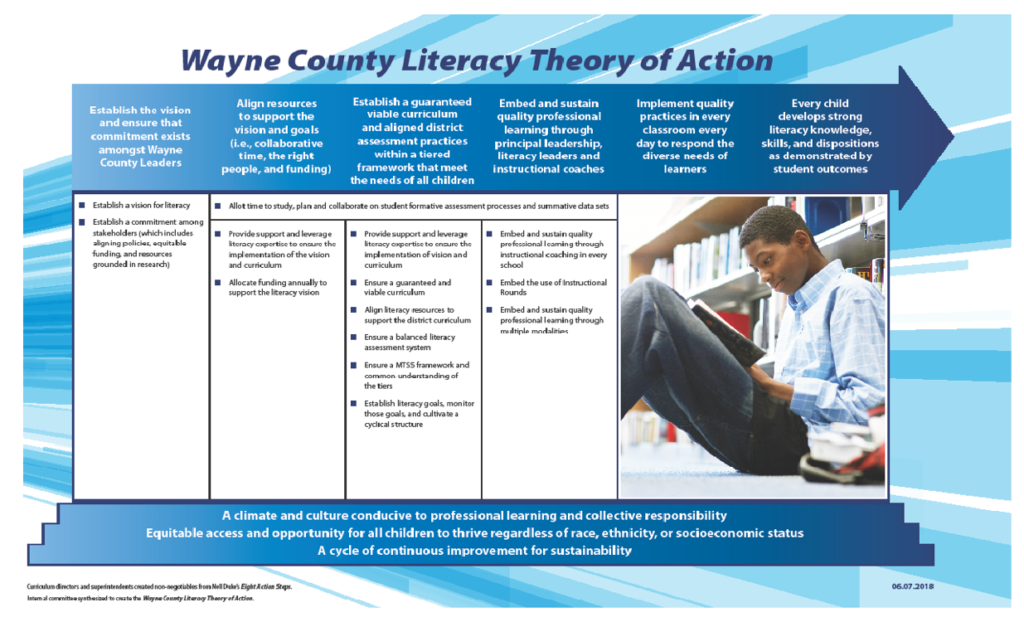
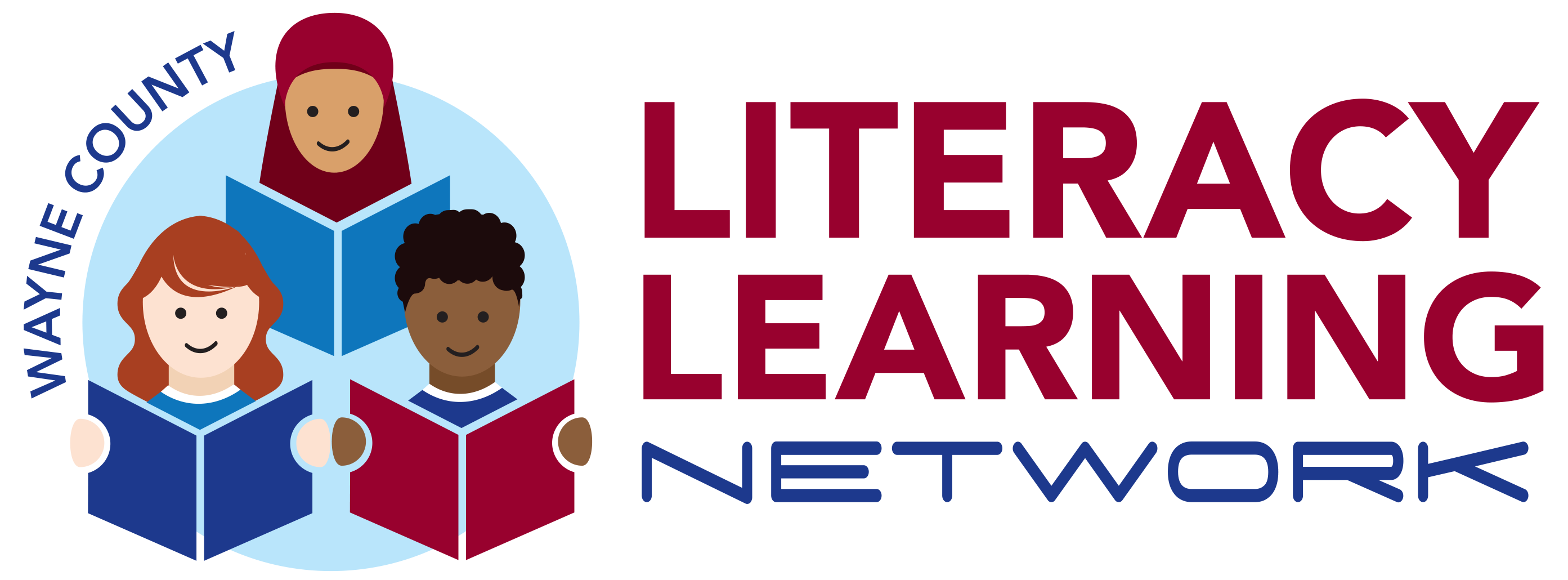
Updates
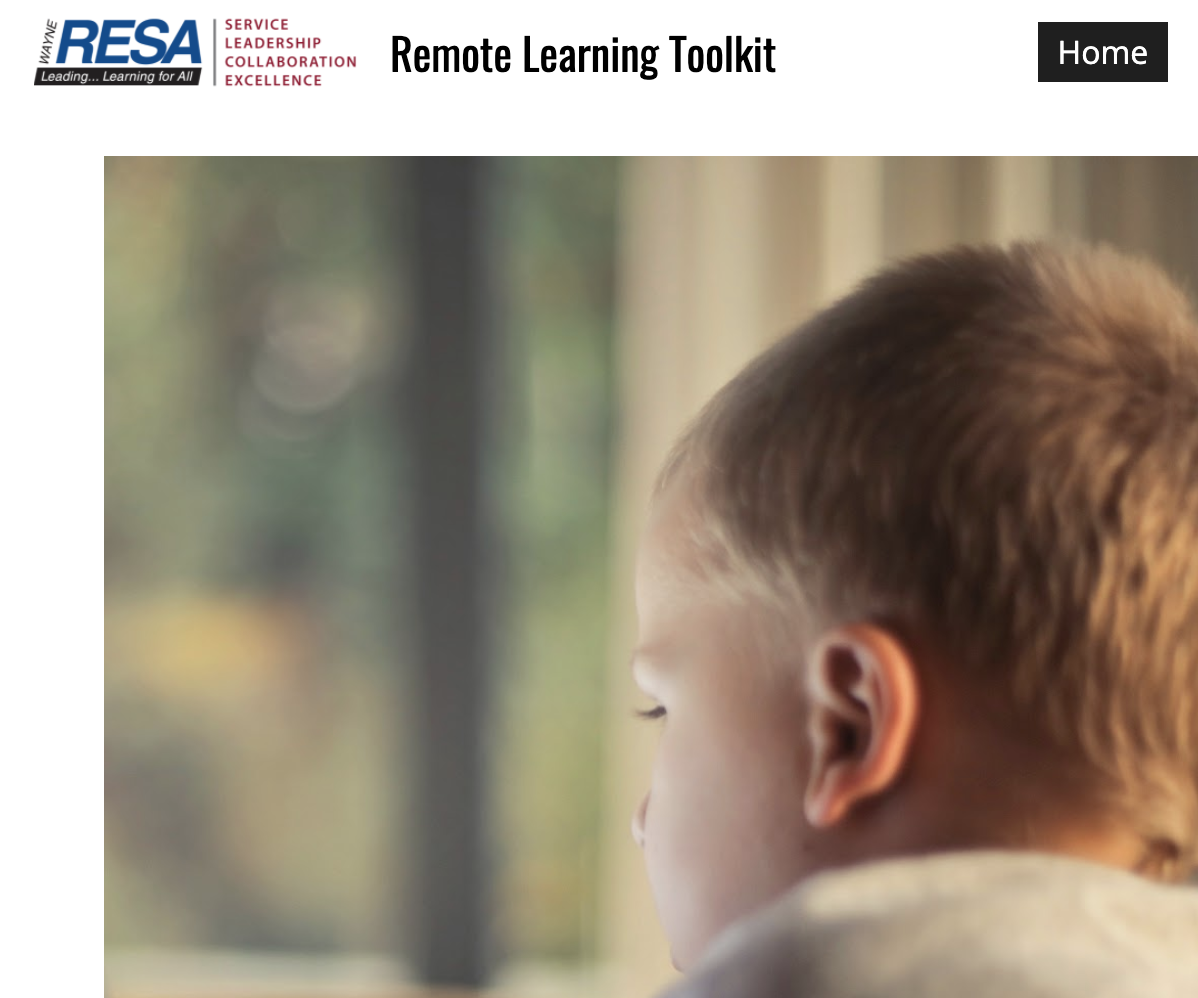
Remote Learning: A Resource for Educators and Families
Throughout the week of March 9, educational institutions from kindergarten through college began to make difficult decisions about closing schools to protect learning communities and their families from COVID-19. In response, a team of Wayne RESA consultants representing different areas of expertise came together to create a toolkit, intended primarily for educators, which includes a planning tool for remote learning, educator resources, special education and social emotional considerations, and family resources. In addition, the site provides suggested best practices and schedules as well as links to digital tools that can assist in instructional delivery of remote learning. Shortly after the Governor announced Executive Order 2020-35, this Wayne RESA team refined the website, adding content that will support schools and families throughout the coming months as they continue to “shelter in place.” The Continuity of Learning site embodies a whole child approach and aligns resources with the state’s Continuity of Learning plan requirements. The materials provided can be used by teachers and parents to support and enhance student learning at home.
Professional Learning Opportunities for Secondary Educators
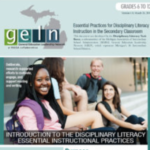
Wayne RESA is partnering with Reading Apprenticeship to offer up to three cohorts (40 teachers per cohort) of professional learning around disciplinary inquiry. This five day series will be funded through a West Ed grant and will be provided at no cost to participants. Reading Apprenticeship is a research-based professional learning model and instructional framework designed to improve student literacy and learning. With a focus on discipline-based ways of thinking, reading and writing, Reading Apprenticeship is not a curriculum but a way of working with teachers and students to help them make the most of their own subject knowledge, tools, and curriculum so that even inexperienced student readers and writers can engage with complex texts and gain deeper understanding of core subject area concepts. Dates for this year-long initiative include initial training in late June (23-25) with follow-up dates scheduled for March 9-10, 2021. WestEd is exploring different delivery options, and for those educators currently registered, updates will be provided as soon as they are available. Registration will remain open until the end of April.
The Disciplinary Literacy Task Force continues to develop plans for the Summer Institute (August 4-6). Designed to extend the professional learning offered during the two Regional One-day Institutes, the Task Force is exploring ways to engage educators across the state remotely. Updates will be provided as soon as they are available via this flyer. In the meantime, please follow us on Twitter @GELN612Literacy. We are posting weekly articles to continue our state-wide conversation about disciplinary literacy and ways to engage our secondary students in discipline-specific literacy practices.
Statewide Updates
| In partnership with Michigan Virtual and EduPaths, all educators in Michigan have free access to the suite of online modules featuring in-depth study of the MAISA GELN Essential Practices. The modules offer online training for PreK-Grade 3 teachers, Administrators, and Literacy Coaches and will provide all stakeholders with a strong basis of research-supported content knowledge in literacy within the role(s) they serve. An overview of the module content can be found in the Guide to Michigan’s FREE Online Professional Learning Materials on Research-Supported Practices in Literacy. When used as intended, in ongoing professional learning within a district system, the modules’ content presentations, videos, and supporting documents create an environment to foster and promote personal reflection, discussion, and planning in response to new learning. The WRESA Literacy Consultants are readily available to provide side-by-side support to district and building-level teams seeking to engage in the modules, serving as facilitators, co-facilitators, or simply thought-partners on how best to initiate the learning opportunity. Additionally, the WRESA Department of Literacy is developing virtual learning opportunities especially for Wayne County coaches, educators, and leaders to further engage around how the Essential practices apply in our current reality of virtual teaching, learning, and connecting. Please contact Mellissa Wilson (734-334-1459) with any questions. |
| The Michigan Department of Education has created an Educator’s Guide to Supporting the Social and Emotional Needs of Students. In response to the COVID-19 health crisis, this guide provides strategies and resources for both educators and families in an effort to meet the myriad needs of people throughout our state. |
| The Michigan Department of Education, in collaboration with a comprehensive list of Michigan’s professional organizations and numerous classroom teachers, has produced a Learning at a Distance Guide. This document supports educators as they strive to meet the needs of students and their families, many of whom have limited resources. |
| The Michigan Department of Education is working with Washtenaw ISD to create guidance around the fall 2020-21 administration of the Kindergarten Readiness Assessment. More information will be shared as soon as it becomes available. The most current KRA FAQ can be found here. For additional information, please contact Heather Rottermond. |
Books and Strategies

Book Talk
Igniting Passion in Readers of All Ages
My Hero Is You
Helen Patuck and IASC
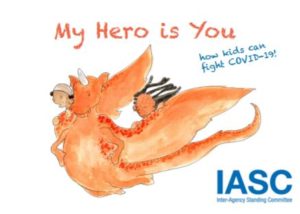 This story was written in response to the impact of the coronavirus on children. Compiled from the stories of over 1000 families and educators, this picture book highlights the adventures a dragon-like creature named Ario who helps children mitigate their fears and wonderings about this global pandemic. The book is intended to be read with an adult or caregiver in order to stimulate conversations about healthy behaviors (i.e., washing hands) and concerns about the virus.
This story was written in response to the impact of the coronavirus on children. Compiled from the stories of over 1000 families and educators, this picture book highlights the adventures a dragon-like creature named Ario who helps children mitigate their fears and wonderings about this global pandemic. The book is intended to be read with an adult or caregiver in order to stimulate conversations about healthy behaviors (i.e., washing hands) and concerns about the virus.
Tomorrow I’ll Be Kind
Jessica Hische
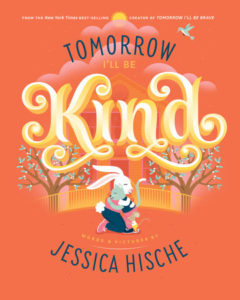 Following the success of Tomorrow I’ll Be Brave, Hische uses whimsical drawings to focus on positive behavior and self-beliefs. Providing examples of each, the narrator promises to be helpful, patient, gentle, honest, generous, grateful, and kind–tomorrow. All of this thinking tires the young narrator who sleepily prepares to “dream of all the good that comes / when we all just try our best.”
Following the success of Tomorrow I’ll Be Brave, Hische uses whimsical drawings to focus on positive behavior and self-beliefs. Providing examples of each, the narrator promises to be helpful, patient, gentle, honest, generous, grateful, and kind–tomorrow. All of this thinking tires the young narrator who sleepily prepares to “dream of all the good that comes / when we all just try our best.”
As Brave As You
Jason Reynolds
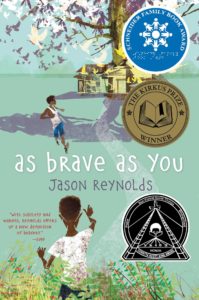 City-slickers Ernie and Eugene are forced to spend the summer with their grandparents in rural Virginia. Adolescent angst keeps Ernie aloof, but Eugene (Genie) is an incessant wonderer who spends the day asking endless questions. As the summer continues, Genie observes the complexities of family relationships, and he discovers that pain and loss can either divide or unite loved ones. Ultimately, Genie realizes that learning to forgive might be the bravest act of all.
City-slickers Ernie and Eugene are forced to spend the summer with their grandparents in rural Virginia. Adolescent angst keeps Ernie aloof, but Eugene (Genie) is an incessant wonderer who spends the day asking endless questions. As the summer continues, Genie observes the complexities of family relationships, and he discovers that pain and loss can either divide or unite loved ones. Ultimately, Genie realizes that learning to forgive might be the bravest act of all.
Seafire
Natalie Parker
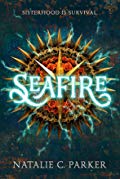
After the boat carrying her family is destroyed by Aric Althair’s men, Caledonia Styx repairs and renames the vessel. As captain of the newly christened Mors Navis, Caledonia and her all-female crew regularly encounter armies of Bullets (Aric’s young male recruits), fighting to save each other and their ship. During one particularly brutal battle, Caledonia’s best friend is saved by a Bullet, and his presence onboard the Mors Navis is both conflicting and enlightening. As Caledonia and her shipmates question the sharp contrasts in their seafaring world, they begin to see the shades of gray that color their lives, their ship and their futures.
American Panda
Gloria Chao
 As a freshmen at MIT, Mei Lu struggles to find herself despite the tight system of control her traditional Tawainese parents impose upon her. Haunted by their decision to disown her older brother, Mei feels compelled to unfailingly obey her mother and father. Yet, in acclimating to college life, she begins to realize that her predetermined path in life is not only unfulfilling but impossible. She keeps her thoughts mostly to herself until she reaches out to her estranged brother, and as she grapples with asserting her position, she finds herself hopelessly straddling the life she has always known and the exciting world of possibilities.
As a freshmen at MIT, Mei Lu struggles to find herself despite the tight system of control her traditional Tawainese parents impose upon her. Haunted by their decision to disown her older brother, Mei feels compelled to unfailingly obey her mother and father. Yet, in acclimating to college life, she begins to realize that her predetermined path in life is not only unfulfilling but impossible. She keeps her thoughts mostly to herself until she reaches out to her estranged brother, and as she grapples with asserting her position, she finds herself hopelessly straddling the life she has always known and the exciting world of possibilities.
Groups at Work: Strategies and Structures for Professional Learning
Laura Lipton and Bruce Wellman
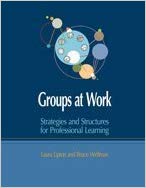 While this book is perfect for literacy coaches, teachers will find the strategies for group work quite useful, too. Lipton and Wellman have categorized over sixty protocols according to a group’s desired action (i.e., activating, goal setting, or discussion), and they include explicit directions on how to use them. Readers will encounter some familiar methods (i.e., Think & Write/Pair & Share), but there are many new protocols that coaches, facilitators and/or teachers can use to entice group interaction. The authors have also included tips for important considerations such as time management and group formation.
While this book is perfect for literacy coaches, teachers will find the strategies for group work quite useful, too. Lipton and Wellman have categorized over sixty protocols according to a group’s desired action (i.e., activating, goal setting, or discussion), and they include explicit directions on how to use them. Readers will encounter some familiar methods (i.e., Think & Write/Pair & Share), but there are many new protocols that coaches, facilitators and/or teachers can use to entice group interaction. The authors have also included tips for important considerations such as time management and group formation.
Writing Circles
Jim Vopat
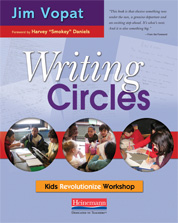 Writing circles expand the traditional writing workshop approach by encouraging students to form small groups and work together to “help each other become better writers.” By sharing their writing with the group, students learn to give and receive constructive feedback in an effort to improve each member’s writing skills. The circles are student-led, which provides both choice and voice when it comes to writing topics and tasks. In this user-friendly text, Volpat provides readers with guidance on building writing communities, teaching mini-lessons, moving through the writing process, providing feedback, and assessing student work.
Writing circles expand the traditional writing workshop approach by encouraging students to form small groups and work together to “help each other become better writers.” By sharing their writing with the group, students learn to give and receive constructive feedback in an effort to improve each member’s writing skills. The circles are student-led, which provides both choice and voice when it comes to writing topics and tasks. In this user-friendly text, Volpat provides readers with guidance on building writing communities, teaching mini-lessons, moving through the writing process, providing feedback, and assessing student work.
The 2020-2021 School Year: How Might a Pandemic Shape the Future of Teaching and Learning?
On March 16, schools throughout the state of Michigan closed their doors to students and staff. While initially meant to be a temporary precaution, Governor Whitmer more recently issued an executive order to keep students, teachers and families safe by shuttering schools for the remainder of the year. Her actions are not unique; in fact, schools throughout the world have made similar decisions, effectively sending administrators and teachers scrambling to enact remote learning plans that will best meet the needs of their students. Amid very difficult discussions are the overarching issues of equity and access, and in most cases, despite the very best intentions of districts, some students will be left behind, “especially [those] with disabilities, students living in poverty, and those who are homeless” (Morton, 2020). While the 2019-2020 school year will finish throughout the state of Michigan using a plethora of different approaches (i.e., hard copy packets, blended learning, online instruction), experts around the world are weighing in on the permanent impact the coronavirus may have on the K-12 system. Harvard professor and former Massachusetts Secretary of Education Paul Reville (2020) asserts, “Twenty-first century learning absolutely requires technology and internet […], and that means the state and local school districts are going to have to act urgently and nimbly to
fill in the gaps in technology and internet access.” However, the solution isn’t as simple as this; many parents and guardians lack the digital literacy to help their children, or they have little expertise or time to manage a homeschooling schedule. In addition, schools provide much more than educational support for their communities. Thus, as districts throughout Michigan develop and execute Continuity of Learning plans for the remaining weeks of the current school year, there are undoubtedly deep conversations about the systems they presently have in place and what will need to shift in the future should an emergency plan need to be enacted again. As digital learning opportunities may increase, educators will still need to consider how to meet the basic and socio-emotional needs of their students (i.e., meal distribution, human connection). They will also need to create equitable plans that provide unequivocal access to educational opportunities for all of their students. While physical resources must be considered, so will teacher and community training. Adaptability and resiliency will be at the forefront of these plans, and as we have seen in the past weeks, educators continually adjust and readjust because of their deep devotion to their students and a firm belief that education makes a difference.
Noteworthy News
Every child deserves a champion—an adult who will never give up on them, who understands the power of connection and insists that they become the best that they can possibly be. – Rita Pierson
Despite the necessary physical separation imposed by COVID-19, teachers across Wayne county continue to find creative ways to communicate heartfelt messages of encouragement, compassion and support to their students.

Numerous tweets and posts have proclaimed teacher appreciation, which is deservedly at an all-time high as parents across the nation try to create learning environments in their homes.
Professional Learning
The following professional learning sessions were planned for the remainder of the 2019-2020 school year. The Wayne RESA Literacy Team is currently exploring ways to provide remote learning opportunities for our literacy educators throughout the county. As adjustments or cancellations are made to the sessions listed below, registered participants will be informed via email. Thank you for your patience as we look for effective ways to connect with you in the coming months.
| Upcoming Events at Wayne RESA |
| See the Professional Growth pages on the Wayne RESA site for links to course offerings, their descriptions, and online registration. |
| Elementary |
| Leslie Blauman: Writer’s Workshop – Making It Real: May 12 |
| Are you looking for ways to strengthen your students’ engagement, skill and independence as writers? Join national literacy consultant Leslie Blauman, author of Kid-Tested Writing Lessons for Grades 3-6 and The Inside Guide to the Reading-Writing Classroom, and explore effective classroom structures and strategies that support engagement in authentic, sustained writing. As they examine key components of the writing process and the architecture of the one-to-one conference, participants will refine their skill in noticing and naming writers’ strengths and challenges to determine next steps for instruction. For additional information, contact Bridget Regan. |
| Stephanie Harvey – Integrating Literacy and Content Learning: Will Be Rescheduled for 2021 |
| Are you searching for a way to effectively immerse students in the richness and intrigue of content area learning while at the same time supporting their on-going literacy development? Join world-renowned literacy specialist and best-selling author, Stephanie Harvey, for an inspiring day exploring researcher’s workshop—a powerful and authentic instructional approach which adapts the familiar structures of reader’s and writer’s workshop to support students’ engagement and independence as learners. Throughout this workshop, Harvey will address the six cornerstones which foster thoughtful learning, including curiosity, workshop, content, comprehension, collaboration, and environment, which together provide a strong foundation for inquiry at every grade level across the curriculum. For additional information, contact Debra Reeves. |
| Secondary |
| 180 Days – Reimagining Language Arts Instruction: April 20, May 7, June 1 and June 9 |
| In this interactive course, Penny Kittle and Kelly Gallagher will demonstrate how they: (1) plan a year of instruction; (2) design specific units of study; and (3) plan and execute daily lessons. Participants will have an opportunity to reimagine units of study using Gallagher’s and Kittle’s newest book 180 Days and Michigan’s Essential Practices for Disciplinary Literacy Instruction in the Secondary Classroom. Participants will also explore ways to deepen student engagement through diverse texts, integrate various compelling reasons for writing for real audiences and authentic purposes, and learn to examine student work as data for making instructional decisions. The intended audience for this course is secondary language arts teachers, instructional coaches, reading specialists, and instructional leaders (6-12 Essential Practices #2, #4, & #8 are the focus of this series). For additional information, contact Rosalyn Shahid. |
| Reading Apprenticeship – Supporting Effective Teaching with Disciplinary Inquiry: June 23 – 25 and March 9 – 10 |
| Supporting Effective Teaching with Disciplinary Inquiry (SETDI) is a free Reading Apprenticeship teacher training program offered by the Strategic Literacy Initiative from WestEd, funded by a federal SEED (Supporting Effective Educator Development) grant. Reading Apprenticeship is a research-based professional learning model and instructional framework to improve student literacy and learning. With a focus on discipline-based ways of thinking, reading, and writing, Reading Apprenticeship is not a curriculum but a way of working with teachers and students to help them make the most of their own subject knowledge, tools, and curriculum, so that even inexperienced student readers and writers can engage with complex texts and gain deeper understanding of core subject area concepts. The intended audience for this course is secondary classroom teachers. For additional information, contact Laura Gabrion. |

Resources: Where can I find...
To help teachers during the COVID-19 crisis, Google has created Teach from Home, which is a temporary hub of information, tips, training and tools.
With the demands of learning management systems, Google Drive, email, and other web-based resources, you might find yourself with too many tabs open. Try the OneTab Chrome Extension to save memory and eliminate unnecessary confusion.
Wayne RESA Literacy Team
Now more than ever, we stand ready to serve you. Please don’t hesitate to reach out to any of us as you navigate new territories in teaching and learning. We believe in you!
Meet Colleen Whalen

Colleen Whalen is a Literacy Consultant for Wayne RESA. She has served in various capacities throughout her 30 years in education including roles as an elementary teacher, literacy coach, and English Language Arts curriculum and instruction consultant. Colleen received her Bachelor of Science degree and Master of Arts degree from Eastern Michigan University, Ypsilanti, Michigan. She is also a credentialed facilitator for the MAISA Intensive Literacy Coaching Institute. Colleen’s practice centers around effective, evidence-based literacy instruction and embedded professional development, and she promotes collaborative inquiry as a structure for professional learning with literacy leadership teams.
We look forward to hearing from you!
Laura Gabrion
Debbie Reeves
Bridget Regan
Rosalyn Shahid
Mary-Lu Strimbel
Mari Treece
Michelle Wagner
Colleen Whalen
Mellissa Wilson
If this newsletter has been forwarded to you, and you’d like to subscribe to it, please contact Laura Gabrion.
![]() 33500 Van Born Road • Wayne, MI 48184 • 734.334.1300 • 734.334.1620 fax • www.resa.net
33500 Van Born Road • Wayne, MI 48184 • 734.334.1300 • 734.334.1620 fax • www.resa.net
Board of Education
James S. Beri • Mary E. Blackmon • Danielle Funderburg • Lynda S. Jackson • James Petrie
Randy A. Liepa, Ph.D., Superintendent